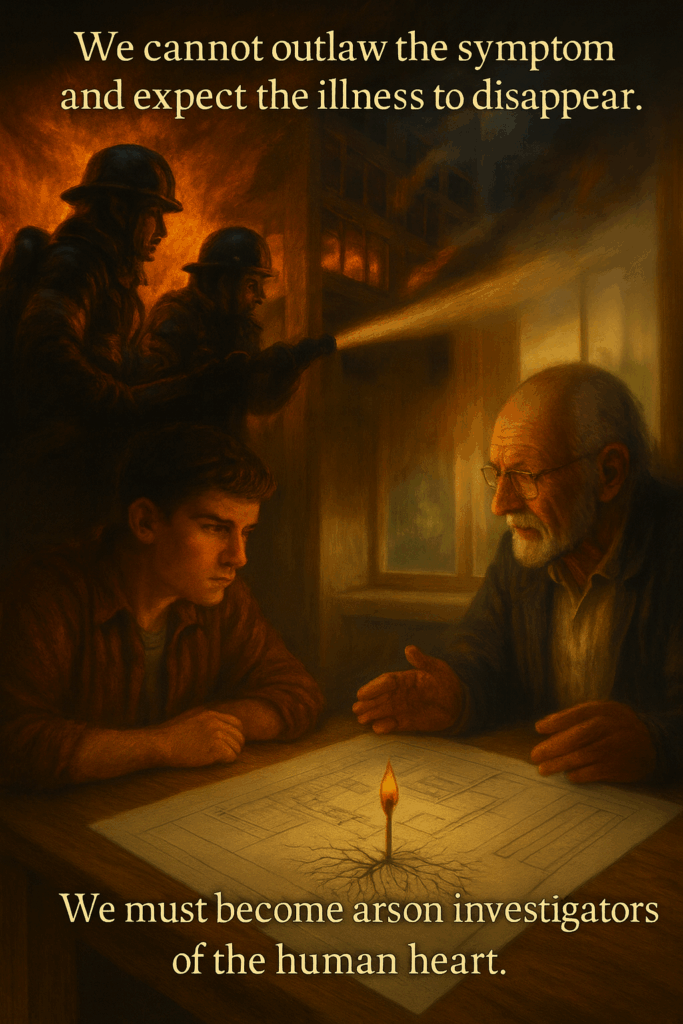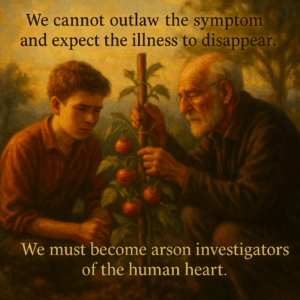
The next morning, Emil found his grandfather already in the garden, gently tying a tomato vine to a new stake. The air was cool and carried the scent of damp earth and night-blooming jasmine. Emil had slept poorly, the grand, terrible machinery of the world grinding through his dreams. The abstract “Four Absences” had taken on the concrete faces of news anchors and history books.
He stood silently for a moment, watching the old man’s careful hands, then spoke, his voice rough with the weight of his night-long vigil.
“Grandfather… after the last great war, humanity swore ‘never again.’ They built the United Nations, the Geneva Conventions, the International Court—systems meant to guard peace, to stop the slaughter. But still wars come. Still massacres happen. Still nations trample the weak.” He picked up a stray twig, snapping it in two. “If the systems exist… why do we keep repeating the same horrors? We are taught in schools not to commit genocide, yet our leaders openly support it—some by sending bombs and profiting from the fire, others by delivering fine speeches while doing nothing to quench it. The systems feel… like a lie.”
Grandfather finished his knot, his movements unhurried. He did not look at Emil, but at the delicate joint where the vine met the stake.
“The systems are not a lie, Emil,” he said, his voice quiet but firm. “They are a fire brigade.”
He finally turned, his eyes holding the morning light and a profound, weary sadness.
“And a fire brigade, for all its courage and necessity, does not exist to prevent fires. It exists to respond to them. The UN, the Courts, the Conventions—they are the world’s best attempt to pour water on a blaze that has already erupted. They are an ambulance at the bottom of a cliff. They are necessary. They save lives. But they do not stop people from falling.”
He wiped his hands on his trousers and gestured for Emil to sit with him on the old bench.
“The error is in believing that systems of restraint can cure a disease of consciousness. You cannot outlaw a symptom and expect the illness to disappear. The Four Absences are the illness. The wars are the symptom.”
He laid it out, point by point, his finger tracing lines in the dew on the wooden slats between them.
“The systems are built by nations. And nations are, by their very nature, expressions of Absence One. They are built on the idea of exclusive sovereignty, of ‘our interests first.’ So, you have a system designed to manage a disease, but the managers are themselves infected. A nation will champion the International Court when it accuses its enemy, and denounce it as illegitimate when it investigates its own generals. It will invoke the Geneva Conventions for its own soldiers and find legal justifications for ignoring them for the ‘terrorist’ who has no face.”
“The system,” he concluded, “is only as strong as the wisdom and humanity of the powers that control it. And when those powers are operating from the Absences, the system becomes not a tool for peace, but another weapon—a tool for legalistic warfare, for scoring points, for dressing vengeance in the fine clothes of a ‘just sanction’ or a ‘humanitarian intervention’ that serves a strategic interest.”
Emil felt a cold despair. “So it’s hopeless? The systems are useless?”
“No,” Grandfather said, his voice sharpening. “The ambulance is not useless because people keep falling. It is essential. It is the difference between a broken body and a dead one. The fire brigade is the difference between a city burned to ash and a neighborhood saved. These systems are a monumental achievement. They are the world’s immune system. But an immune system that is constantly fighting a disease will eventually grow weak and fail. It must be paired with a way of life that does not create the disease in the first place.”
He placed a hand on Emil’s knee. “You ask why we teach one thing in schools and do another in statecraft. It is because we have built the ambulance, but we have not cured the patient. We have not yet learned to live from the Presences.”
“Then what is the answer?” Emil whispered, the scope of the problem feeling immense.
“The answer is not to abandon the fire brigade. It is to become arson investigators.” Grandfather’s eyes grew intense. “The real work—the slow, unglamorous, lifelong work—is what you began in that greenhouse. It is to build systems of light from the ground up. To teach the Presences not as a school lesson, but as a practice. To create communities where the logic of the Absences—us vs. them, vengeance over justice, dehumanization—is simply obsolete, because it doesn’t work. It doesn’t feed anyone. It doesn’t build anything.”
He paused, his gaze moving from the tomato vine to the horizon. “And history does give us glimpses. After the last war, Europe chose not only to rebuild walls, but to pool coal and steel—the very materials of war—so they could not be turned against each other again. Imperfect, yes, but it showed the truth: when you remove the fuel, you starve the fire.
And what followed was even more radical. They built a union that replaced vengeance with justice through a shared court and shared laws. They replaced borders with bridges, letting people, goods, and ideas flow freely—so the ‘other’ became familiar again. And they turned mercy into strength, binding the community tighter by lifting its poorest regions. These were not speeches. They were structures. They were habits. They were systems of light designed to make peace the default, and war the costly exception.”
“The world’s systems will change,” he said, his voice softening again, “only when the weight of a new way of living becomes too great to ignore. When enough people, enough communities, have become living proof that there is another way. Your forum, your ledger, your offering of a basil plant… that is not a small thing. That is the most radical thing. You are not just putting out a fire. You are teaching people not to play with matches. You are not just treating a symptom. You are building a world with a stronger immune system.”
He stood up, offering a hand to Emil. “The world’s courts will argue over the laws of war. But you, Emil, you are learning the laws of peace. And that is the medicine we have been waiting for.”
The sun had risen above the wall, warming their faces. The fire brigade, somewhere in the world, was racing toward another blaze. But here, in the quiet of the garden, the arson investigators were already at work, planting seeds in the ashes.


